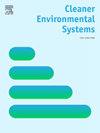Trade-offs in technical and environmental performance of water utilities: Insights focused on water-energy-carbon nexus
IF 4.9
Q2 ENGINEERING, ENVIRONMENTAL
引用次数: 0
Abstract
Within the water-energy-carbon nexus, understanding the trade-offs among resource use, drinking water delivery, and greenhouse gas emissions is essential for ensuring the sustainable provision of drinking water. Addressing this challenge, this study estimates four performance indices—technical efficiency, ecological efficiency, process environmental quality efficiency, and overall efficiency —using a unified framework based on Data Envelopment Analysis. The analysis was conducted under two scenarios, reflecting water companies’ prioritization of production and environmental dimensions. The empirical application, performed on a sample of English and Welsh water companies, revealed that water companies focused on technical efficiency, achieving average scores of 0.648 and 0.798 under environmental and production prioritization scenarios, respectively. In contrast, process environmental quality and ecological efficiency metrics were considerably lower, with average values of 0.179 and 0.129 for the environmental scenario and 0.153 and 0.131 for the production scenario. The temporal evolution of these performance indices highlights a trade-off between technical efficiency and performance indices integrating carbon emissions under the environmental prioritization scenario.
水务公司技术和环境绩效的权衡:关注水-能源-碳关系的见解
在水-能源-碳关系中,了解资源利用、饮用水输送和温室气体排放之间的权衡对于确保可持续提供饮用水至关重要。针对这一挑战,本研究采用基于数据包络分析的统一框架,估算了技术效率、生态效率、过程环境质量效率和整体效率四个绩效指标。分析是在两种情况下进行的,反映了水公司对生产和环境维度的优先考虑。对英格兰和威尔士水务公司样本进行的实证应用显示,水务公司关注技术效率,在环境和生产优先情景下分别获得0.648和0.798的平均得分。过程环境质量和生态效率指标相对较低,环境情景的平均值分别为0.179和0.129,生产情景的平均值分别为0.153和0.131。这些绩效指标的时间演化凸显了环境优先情景下技术效率与整合碳排放的绩效指标之间的权衡关系。
本文章由计算机程序翻译,如有差异,请以英文原文为准。
求助全文
约1分钟内获得全文
求助全文
来源期刊

Cleaner Environmental Systems
Environmental Science-Environmental Science (miscellaneous)
CiteScore
7.80
自引率
0.00%
发文量
32
审稿时长
52 days
 求助内容:
求助内容: 应助结果提醒方式:
应助结果提醒方式:


